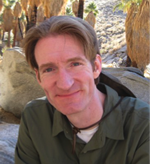University of Redlands Emergency Alert System
Alert Received: . For more information, visit: https://www.redlands.edu/alert/
University of Redlands
Professional Bio:
 Dr. Eric Hill got his BA in Physics from Carleton College in 1994 and his PhD from the University of Minnesota in 2001, with a focus in Condensed Matter Physics and a minor emphasis in Space Physics. His thesis work, done under Eric Ganz, used scanning tunneling microscopy to investigate atomic-scale dynamics and structures relevant to the semiconductor industry. His teaching mentor was Ken Hellar, who's active in the Physics Education Research community. After serving as a visiting professor at St. Olaf College, Eric joined the University of Redlands' Physics department in 2001. Since that time, he's taught courses in the Johnston program, the Proudian program, and the First Year Seminar program, as well as all of the physics department's regularly-offered courses aside from astronomy. He was named the Mortarboard Professor of the Year for 2008. Within faculty governance, he's served on the college's Curriculum Committee and the university's Educational Assessment Committee; he's currently serving on the college's Embedded Speaking Experience task force. In 2012 he helped establish the University's Engineering Combined-Degree partnerships, and he serves as its Liaison / Advisor. He is also a member of the Spatial Studies Advisory Committee and is completing a stint as physics-department Chair. As an experimentalist (and owner of an old house), he's a firm believer in use the right tool for the job." For his classes, that means a variety of instructional tools and modes.
Dr. Eric Hill got his BA in Physics from Carleton College in 1994 and his PhD from the University of Minnesota in 2001, with a focus in Condensed Matter Physics and a minor emphasis in Space Physics. His thesis work, done under Eric Ganz, used scanning tunneling microscopy to investigate atomic-scale dynamics and structures relevant to the semiconductor industry. His teaching mentor was Ken Hellar, who's active in the Physics Education Research community. After serving as a visiting professor at St. Olaf College, Eric joined the University of Redlands' Physics department in 2001. Since that time, he's taught courses in the Johnston program, the Proudian program, and the First Year Seminar program, as well as all of the physics department's regularly-offered courses aside from astronomy. He was named the Mortarboard Professor of the Year for 2008. Within faculty governance, he's served on the college's Curriculum Committee and the university's Educational Assessment Committee; he's currently serving on the college's Embedded Speaking Experience task force. In 2012 he helped establish the University's Engineering Combined-Degree partnerships, and he serves as its Liaison / Advisor. He is also a member of the Spatial Studies Advisory Committee and is completing a stint as physics-department Chair. As an experimentalist (and owner of an old house), he's a firm believer in use the right tool for the job." For his classes, that means a variety of instructional tools and modes.
Project Summary:
Nationally, a significant fraction of physics graduates go into engineering; either they directly find employment in positions that are traditionally associated with engineering, they enroll in engineering graduate programs, or they go on to earn an engineering bachelors as part of an Engineering Combined-Degree option, like the one we introduced in 2012. But at liberal arts colleges, physics students get little exposure to the diverse fields of engineering, so they aren’t well informed about their options. The Task Force for Online Learning’s grant helps address that problem at Redlands. The grant supports a May-Term Survey of Engineering course, which uses a hybrid instructional mode to connect Redlands students with engineers – both academic and professional, here and across the country. While the students are here at Redlands, engineering faculty at Manhattan College in New York will provide online content and will host live video conferences to teach our students about chemical, civil, electrical, environmental, and mechanical engineering. Meanwhile, the Redlands instructor will lead the students through laboratory experiments here, taking them on field trips to research labs at UC-Riverside, and bringing in professional engineers from around the region. This May’s offering is a pilot for a possible long-term collaboration between Redlands and Manhattan; the grant helps the collaboration over the development hump. Once the resources are developed and contacts are made this year, the course could be more easily offered future May’s or, given its modular structure (one per engineering sub-field) it could be reconfigured into stand-alone, one-unit modules that students could take independently during a regular semester.